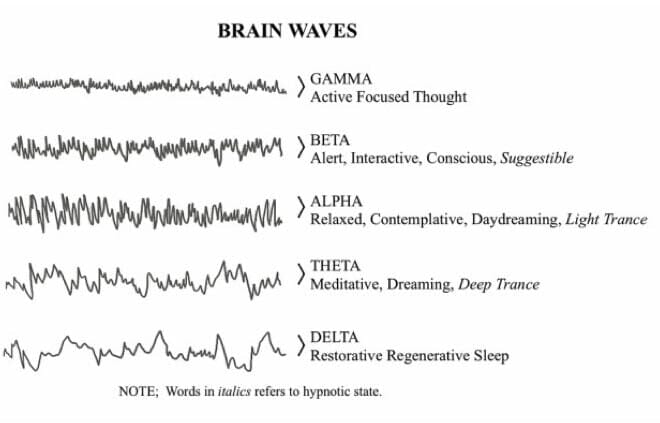HYPNOSIS
HYPNOSISMindful Healing Hypnotherapy
- WHAT IS HYPNOSIS? Hypnosis is actually a natural state of mind that we experience many times a day. People, whether they know it or not, drift in and out of a trance-like state frequently. For example, you have caught yourself daydreaming while driving your car, and seemingly arrived at your destination quickly; you were in a state of hypnosis. You were not asleep while in that state of hypnosis. Sleep is a state of rest and hypnosis is a state of mindfulness. The chart below indicates Brain Wave patterns that are produced by the human brain every day. Hypnosis is simply experienced in the Alpha and Theta patterns and is a very normal and natural state of being.
- WHO CAN BE HYPNOTIZED?
Anyone with an open mind, reasonable intelligence, an ability to concentrate, and a willingness to go into a relaxed state of mind. Some people are able to experience deep hypnosis very quickly while others may experience a light to medium hypnotic trance. - IS HYPNOSIS DANGEROUS?
There has never been a documented case of harm coming to anyone from the therapeutic use of hypnosis. In the mid 1950’s both the AMA and the BMA approved of the use of hypnosis and deemed it “to not cause detrimental harm to the general health” but warned the practice of hypnosis should be used with caution and care for the patient. With more recent research on the brain and it’s functions, we now understand how physiology is influenced by our thoughts and feelings. - WHAT DOES IT FEEL LIKE TO BE HYPNOTIZED? CAN I BE HYPNOTIZED?
Hypnosis is a very pleasant feeling of complete physical and mental relaxation. It is similar to that moment, just seconds before you fall asleep and you are aware of the moment, because you have experienced in the past. Often, when you are in hypnosis, you find your mind active, you hear every sound in the room, that you can resist the suggestions if you choose to, you realize that you are not asleep, and you are able to remember everything perfectly, all of these factors lead people to believe that they were not hypnotized, when indeed they were. Hypnosis, of course, is determined on whether or not you can allow relaxation to occur and what you want to have happen during a session. Most people have a preconceived idea of hypnosis and believe they will be asleep or unconscious, or go through something strange or even miraculous in the hypnotic state. In actuality, you will be able to hear, remember, and experience everything that is going on around you. - HOW DOES HYPNOSIS WORK?
Everything you have learned is stored in your subconscious mind, the way you walk, brush your teeth, eat, or drive your car. Unwanted habits such as smoking or overeating are stored in your subconscious too. Some learned activities such as playing golf, biking or playing chess are things you want to keep and perhaps even improve upon, others such as smoking or overeating, you may want to limit or get rid of altogether. The process of hypnosis gives the subconscious mind suggestion and productive information for change or improvement. Entering a state of deep relaxation and connecting with the subconscious, post hypnotic suggestions are given, and of course they are your intentions, not the intentions of the hypnotherapist. Success depends on intention, motivation and commitment. Some goals are reached immediately while others take more reinforcement; each individual is different. - CAN A PERSON BE HYPNOTIZED AGAINST THEIR WILL OR MADE TO DO ANYTHING AGAINST THEIR WILL?
No one is able to be hypnotized against his or her will. If people were, hypnosis would be the most closely guarded secret on the planet. Entering hypnosis is a consent state. Because all hypnosis is self-hypnosis, the hypnotist assists the subject, who then hypnotizes him/herself. - DO PEOPLE HAVE TROUBLE COMING OUT OF HYPNOSIS?
Because the state of hypnosis is now known to simply be a brain wave pattern that is normal for any healthy brain (alpha and/or theta), it is impossible for anyone to stay in a hypnotic trance state. One may choose to stay in hypnosis after the hypnotherapist invites you to come back to full alertness because it is such a relaxed feeling of enjoyment; you just prefer to stay hypnotized a while longer. When the hypnotherapist waits. you would merely drift into a natural sleep and awaken after a few minutes in the delta brain wave function. There has never been a documented case of someone being unable to come out of hypnosis, any more than someone not waking up after a nap or night’s sleep. - WHAT IS SELF-HYPNOSIS?
We all “self-hypnotize” every day with our mind talk and mind movies. Unfortunately, much of that can be negative and does something to us. AND, it’s still self-hypnosis. When we become mindful of what we want to have happen for us, conscious self- hypnosis provides complete control of our intentions, when we come out of hypnosis and we set your own limits, or limitlessness. Techniques exist by which one can attain a state of self-hypnosis and gain complete relaxation under the most stressful conditions. In this state, the sub-conscious mind is open to therapeutic suggestions. - WHAT EXACTLY IS THE SUB-CONSCIOUS MIND?
The conscious mind, the mind with which you make decisions and choices, is your “me” or “I”. It is the critical part of your mind. The sub-conscious mind is what directs your conduct through habits, emotions, and perceptions acquired from the influences of your environment from birth, and possible before. - HOW DOES SELF-HYPNOSIS DIFFER FROM HYPNOSIS BY A HYPNOTIST?
In self-hypnosis, YOU choose your own time limits, imagery, and intention for self-hypnosis, instead of a scheduled appointment with a hypnotist. Using a hypnotist at the beginning of your awareness training, however, is of great benefit. It speeds up your process of self-improvement. - WHY DO SOME PEOPLE HAVE DOUBTS ABOUT HYPNOSIS?
Hypnosis is such a misunderstood phenomenon, and it is a phenomenon. For centuries, it was affiliated with spiritualism, witchcraft, and various other “unexplainable” events. It was depicted in “B” movies, novels and exaggerated claims as something to fear. In actuality, it was first used by the medical community to perform surgeries and amputations. - DOES HYPNOSIS WEAKEN THE WILL? ARE ONLY WEAK MINDED PEOPLE ABLE TO GO INTO HYPNOTIC STATES?
No. Self-hypnosis strengthens the will. Hypnosis works with the will, not against it. In fact, the more intelligent and strong-willed you are, the more effective hypnosis will be for you. - WHAT IF I CAN’T BE HYPNOTIZED?
Most people feel or think this very same way. The fear is about the incorrect belief that one is giving up control. The opposite is actually true. You are exercising a more powerful form of thought- control than at other times by accepting the suggestions given. The only thought to prevent you from going into hypnosis is the thought, “I can’t, or won’t, be hypnotized.” - WHAT CAN SELF-HYPNOSIS DO FOR ME?
Many things, Instant learning and photographic memory systems are based on self-hypnosis. Champions in many sports such as Evander Holyfield, Larry Bird, and Tiger Woods, and many others all used self-hypnosis to achieve amazing and consistent results in their fields. You can now learn to overcome unwanted and undesirable habits, such as smoking, overeating, or drinking. You can boost your self-confidence, and realize that success is within easy reach of an active mind, and erasing harmful emotions leads to a happier and healthier life. - DO I NEED HYPNOTHERAPY? WILL IT WORK FOR ME?
Hypnosis will work for you. If you have bad habits, stress or want to improve your health and well being then give hypnosis a try. - HOW DO I FIND A QUALIFIED HYPNOTHERAPIST?
We recommend our Graduate Referral Program to help you find a quality certified Hypnotherapist to fit your specific needs, want help overcoming depression, recovering from surgery, improving athletic performance, or simply to stop smoking. Graduates of the Palo Alto School of Hypnotherapy are advanced in the techniques of therapeutic hypnosis, and can assist in the treatment of many problems.
ABOUT US
The school also offers a place for professionals to collaborate and educate each other, and receive instructions on current trends in medical hypnosis and other alternative forms of healing.
OUR COURSES
WORKING HOURS
Monday
9:30am - 10:00pm
Tuesday
9:30am - 5:00pm
Wednesday
9:30am - 10:00pm
Thursday
9:30am - 5:00pm
Friday
9:30am - 5:00pm
Saturday
workshop or closed
Sunday
workshop or closed
Images provided on this website are for personal, non-commercial use. Republication, retransmission, or reproduction of such images is strictly prohibited.










